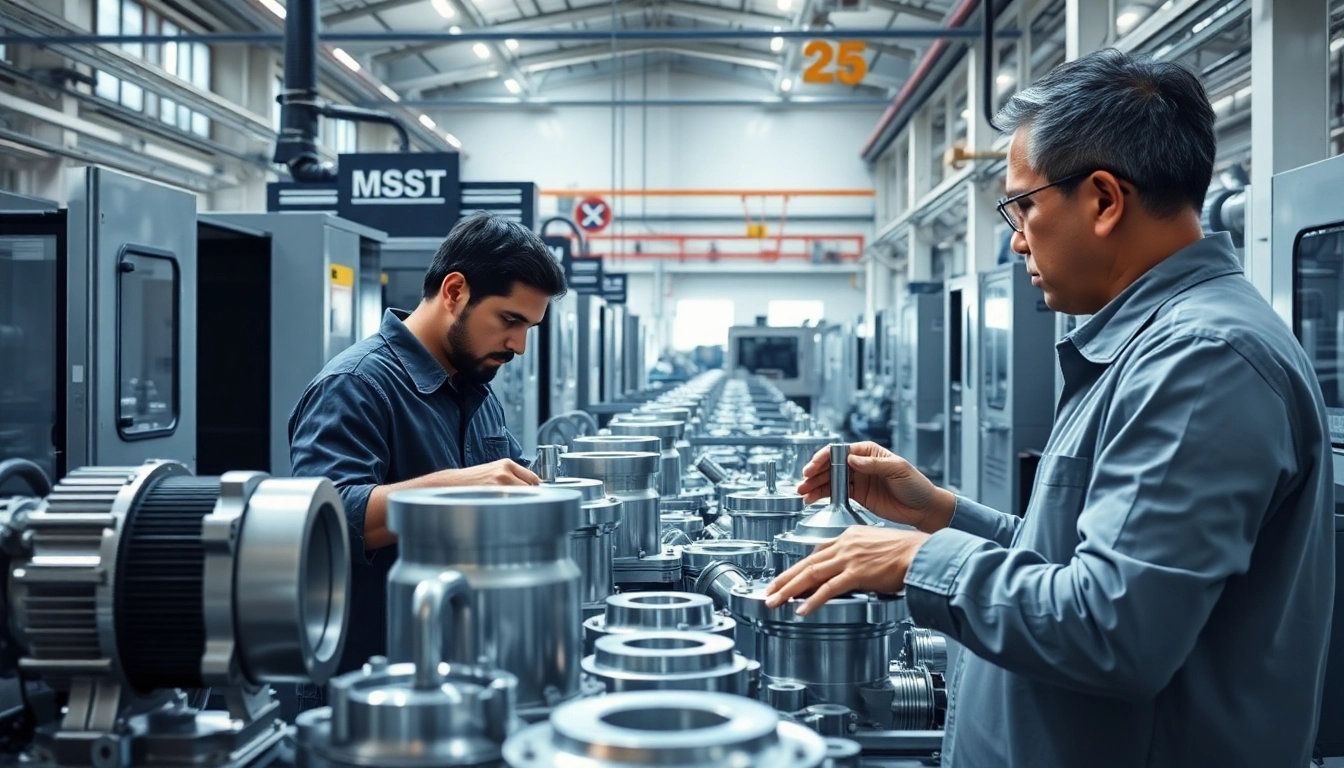The Importance of Precision Die Casting in Malaysia
Precision die casting has become a critical manufacturing process in Malaysia, especially as the demand for high-quality, intricate metal components grows across various industries. With its ability to produce complex shapes with tight tolerances, precision die casting offers manufacturers an efficient means of creating durable and lightweight products. As the market evolves, companies looking to leverage this technology are increasingly turning to precision die casting malaysia for innovative solutions that meet their specific needs.
Understanding Precision Die Casting: A Comprehensive Overview
Precision die casting involves forcing molten metal into a mold under high pressure, allowing it to fill every corner and detail of the mold. This technique is often utilized for materials like aluminum and zinc, which are favored for their lightweight and corrosion-resistant properties. The process of precision die casting encompasses several stages, including:
- Mold Design and Fabrication: Crafting molds from high-quality steel or aluminum to ensure durability and precision.
- Melting the Metal: Heating the metal to its melting point and maintaining optimal temperature for consistency.
- Injection: Using high pressure to inject the molten metal into the mold.
- Cooling: Allowing the metal to cool and solidify before removing it from the mold.
- Finishing: Post-processing steps such as trimming, machining, and surface treatment to enhance quality.
Key Industries Benefiting from Precision Die Casting
Various industries have recognized the advantages of precision die casting for producing complex and high-precision components. Some of the key sectors include:
- Automotive: Producing lightweight parts that improve fuel efficiency without compromising performance.
- Electronics: Creating intricate housings and components for devices ranging from smartphones to computer hardware.
- Aerospace: Manufacturing components with exceptional strength-to-weight ratios to enhance aircraft performance.
- Consumer Goods: Providing durable components for home appliances and tools that require precision engineering.
The Role of Precision in Manufacturing Quality
Precision is paramount in die casting as it directly affects the quality and functionality of the final product. The ability to produce parts with minimal tolerances leads to improved performance, reduced wastage, and lower overall production costs. Moreover, adopting precision die casting enables manufacturers to:
- Reduce the need for extensive post-processing, saving time and labor costs.
- Enhance product consistency, ensuring every part meets stringent quality standards.
- Minimize material waste, leading to more sustainable manufacturing practices.
Technology Advancements in Die Casting
The die casting industry is witnessing rapid technological advancements that are shaping the future of precision manufacturing. As we approach 2025, several innovations are transforming how die casting processes are executed.
Cutting-Edge Machinery and Techniques in 2025
Modern die casting facilities are adopting state-of-the-art machinery that enhances productivity and efficiency. Advancements such as:
- High-Pressure Die Casting Machines: These machines are designed to deliver higher speeds and improved precision, making them ideal for high-volume production.
- Robotics and Automation: The integration of robots for loading, unloading, and quality inspections is reducing human error and increasing throughput.
- 3D Printing for Mold Creation: Utilizing 3D printing technology allows for faster and more cost-effective mold design and fabrication, reducing lead times.
The Impact of Automation on Precision Die Casting
Automation is radically changing the landscape of die casting by streamlining processes and improving efficiency. Automated systems can monitor machinery and production lines, ensuring optimal performance and reducing downtime. Benefits include:
- Increased production rates and lower labor costs.
- Enhanced data collection for continuous improvement and quality assurance.
- Improved safety for workers by reducing manual handling of hazardous materials.
Future Trends in Die Casting Technology
As the industry evolves, several trends are expected to shape the future of precision die casting. These trends include:
- Lightweight Materials: The shift towards aluminum and magnesium alloys for their lightweight and strength properties.
- Sustainability Practices: Increased focus on recycling and reducing environmental impact in manufacturing processes.
- Smart Manufacturing: The adoption of IoT technologies for real-time tracking and monitoring of the die casting process.
Quality Assurance in Precision Die Casting
Quality assurance is a critical component of the precision die casting process. Ensuring that every part meets rigorous quality standards is essential for maintaining customer satisfaction and brand reputation.
Best Practices for Ensuring High-Quality Output
Implementing best practices in the die casting process can significantly enhance the quality of the output. Key strategies include:
- Regular Equipment Maintenance: Ensuring that machinery is well-maintained to prevent defects caused by equipment failures.
- Employee Training: Providing comprehensive training to staff to recognize quality issues and operate machinery effectively.
- Statistical Process Control: Utilizing data-driven approaches to monitor and control the manufacturing process.
Common Defects in Die Casting and How to Avoid Them
Common defects in precision die casting can severely impact product quality. Some prevalent issues include:
- Porosity: Often caused by trapped gas during the casting process. To prevent this, ensure proper venting in the mold design.
- Surface Imperfections: Can be due to mold defects or improper injection speeds. Regular inspection and adjustments can minimize these issues.
- Dimensional Variability: This can occur due to inconsistent cooling rates. Maintaining temperature control throughout the process is crucial.
The Importance of Certifications and Standards
Certifications play a vital role in reinforcing quality assurance in die casting. Standards such as ISO 9001 ensure that manufacturers maintain consistent quality across their operations. Emphasizing compliance with recognized standards helps build trust with clients and partners while enhancing credibility in the industry.
Cost Analysis for Precision Die Casting Services
Understanding the cost implications of precision die casting is crucial for manufacturers seeking to maximize their investment. Several factors influence the overall cost of die casting services.
Factors Influencing Cost in the Die Casting Process
Key factors that influence the cost of precision die casting include:
- Material Selection: The choice of base material (aluminum, zinc, etc.) significantly affects costs.
- Mold Complexity: More intricate molds require additional fabrication time and expertise, increasing costs.
- Production Volume: High-volume orders can reduce per-unit costs due to economies of scale.
Comparative Cost Benefits of Die Casting vs Other Methods
When comparing die casting to other manufacturing processes like machining or sand casting, die casting often presents a cost-effective solution. Some benefits include:
- Lower labor costs due to automation and reduced machining time.
- Minimized waste, which translates to lower material costs.
- Faster production cycles that improve time-to-market.
How to Calculate ROI on Die Casting Investments
Calculating return on investment (ROI) for die casting can help manufacturers determine the viability of their projects. Key metrics to consider include:
- Initial Investment: Total costs associated with mold design, materials, and setup.
- Operational Costs: Ongoing expenses related to labor, maintenance, and material consumption.
- Revenue Generation: Expected income from selling the manufactured parts over a specified period.
Case Studies: Success Stories in Precision Die Casting
Several organizations exemplify success through innovative applications of precision die casting. Exploring these case studies provides valuable insights into the potential of this manufacturing technique.
Innovative Applications in the Automotive Industry
The automotive industry has seen remarkable innovations through precision die casting. For instance, a leading automotive manufacturer revamped its engine components using precision die casting, resulting in a 20% reduction in weight while enhancing performance and fuel efficiency.
Electronics Manufacturing and Precision Die Casting
Another compelling case is in the electronics sector, where companies turned to precision die casting for housing components. This approach not only improved the aesthetics of their products but also provided increased protection against environmental elements.
Future Possibilities: New Markets for Die Casting Services
As the industry continues to evolve, opportunities for precision die casting are expanding into new markets such as renewable energy and healthcare. In the renewable energy sector, precision die casting can produce parts for solar panels, wind turbines, and electric vehicles, helping drive the transition to sustainable technologies.


